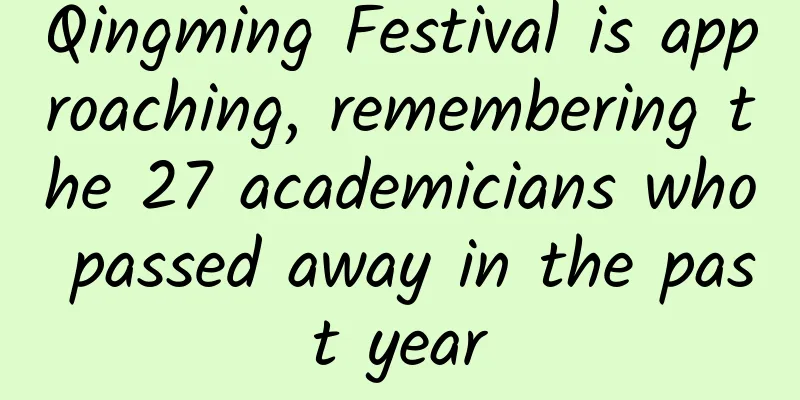Qingming Festival is approaching, remembering the 27 academicians who passed away in the past year

|
◎ Science and Technology Daily reporter Lu Chengkuan Since last year's Qingming Festival, 27 more names have been added to the list of deceased academicians of the Chinese Academy of Sciences and the Chinese Academy of Engineering. They have dedicated their entire lives to my country's science and technology, solving major original scientific problems, bravely venturing into the "unmanned zone" of innovation, or breaking through key core technologies that restrict development... Facing their departure, we express our grief in words. May 22, 2021, is a day of great sorrow for hundreds of millions of Chinese people. On this day, Yuan Longping, an academician of the Chinese Academy of Engineering, passed away in Changsha due to multiple organ failure; Wu Mengchao, an academician of the Chinese Academy of Sciences, died in Shanghai due to illness. The loss of two academicians within one day has caused people's grief to surge like a tide. Born in 1930, Yuan Longping lived a life of displacement with his family since childhood. Before the founding of New China, Yuan Longping saw starving people lying on the roadside with his own eyes, and he was very sad. With a strong desire to let everyone "have enough food", Yuan Longping chose to serve the country through agriculture and vowed to solve the problem of increasing grain production and prevent the people from starving. In the past, the academic community generally believed that rice was a self-pollinating crop and had no hybrid vigor. However, Yuan Longping did not blindly believe in authority and had the courage to say no to traditional academic views. In 1964, he began to study hybrid rice and successfully bred the world's first practical high-yield hybrid rice variety. "People are like seeds, and we must be good seeds." This is a sentence that Yuan Longping often said during his lifetime. He also spent his life writing a footnote to this sentence. He is the pioneer of hybrid rice research and development in my country, known as the "Father of Hybrid Rice". He has devoted his life to the research, application and promotion of hybrid rice technology, and has been fighting on the front line of agriculture for a long time. Even at the age of 90, Yuan Longping never felt that he should rest. He still couldn't stop his legs from heading to the rice fields, and couldn't stop his heart from going to rice. "Hybrid rice is in his blood. It is his lifeblood and his soul." This scientist, who "looks more like a farmer", is "either at home or in the experimental field; not in the experimental field, on the way to the experimental field." He truly writes his papers on the land of the motherland, ensuring that the Chinese people's rice bowl is firmly in their own hands. In the early 1950s, the field of hepatobiliary surgery in my country was still blank. A well-known foreign expert asserted: "It will take at least 30 years for Chinese liver surgery to catch up with our level." After hearing this, Wu Mengchao couldn't sleep that night. He got up and wrote a report that was determined to "break into the forbidden zone", vowing that "the world liver surgery community cannot be without China's voice!" After thousands of anatomical experiments, Wu Mengchao first proposed the "five lobes and four segments" anatomical theory of liver structure in 1957. Chinese doctors have since found the key to unlocking the forbidden area of the liver. In 1960, he performed the first liver tumor resection in my country, achieving a zero breakthrough in this field of Chinese surgery... Wu Mengchao has performed more than 16,000 liver surgeries in his 70-year medical career. He once said, "Even if I collapse in the operating room one day, it will be the greatest happiness of my life!" Looking up at the starry sky, there are two asteroids in the universe, one is the "Yuan Longping Star" numbered 8117, and the other is the "Wu Mengchao Star" numbered 17606 - the contributions of the two academicians to the people and mankind will always be remembered by the world. As outstanding representatives of my country's scientific and technological circles and engineering and technical circles, the academicians of the two academies are the country's wealth, the people's pride and the nation's glory. Among the 27 academicians who passed away in the past year, Zheng Zhemin and Min Guirong are unusual in that they were both academicians of the Chinese Academy of Sciences and the Chinese Academy of Engineering. Zheng Zhemin is one of the founders and pioneers of explosion mechanics in my country, and is known as the man who "tamed" explosives. He always takes national needs as his own responsibility, and his relationship with explosion mechanics was not a deliberate life plan. "There is no clear path for me from the past to the present. But one thing is certain, and that is the desire to enrich the country and strengthen the people," Zheng Zhemin once said. Zheng Zhemin has been working on the explosion mechanics for decades. During this period, he proposed a fluid elastic-plastic model, which promoted the formation of a complete explosion mechanics discipline system, which has been widely used in important national defense fields such as underground nuclear explosions, armor-piercing and ground-penetrating nuclear bombs; he established the basic research methods of explosion mechanics, providing a mechanical basis for weapon design and weapon effect evaluation; he opened up key technical fields such as explosive forming and explosive embankment, and solved the core problems of major engineering construction. Min Guirong is one of the pioneers of my country's artificial satellite engineering and the creator of spacecraft thermal control technology. He participated in leading the development of my country's first artificial satellite and several recoverable and application satellites, making significant contributions to the development of my country's space technology. While serving as the chief scientist of the National "863" Program's Aerospace Expert Committee, Min Guirong led the research work on my country's future innovative aerospace technologies and achieved a large number of important scientific research results. Despite his outstanding achievements, Min Guirong has always been low-key and modest: "Compared with the promising aerospace industry, this is just a good start. We still need to make long-term and unremitting efforts to make due contributions to the Chinese people and to mankind all over the world." There are only 34 people in my country who are both academicians of the Chinese Academy of Sciences and the Chinese Academy of Engineering, such as Zheng Zhemin and Min Guirong. This is related to the establishment of the Academy of Engineering. In 1994, the Chinese Academy of Engineering was established. The first batch of academicians of the Academy of Engineering was nominated, negotiated and selected. The preparatory leading group proposed a list of about 100 people (including 30 members of the Chinese Academy of Sciences with strong engineering backgrounds), which was reported to the State Council for approval and then appointed in the name of the Academy of Engineering. These 30 members of the Chinese Academy of Sciences (later called academicians) became the first batch of dual academicians. In 1995, Yan Kai, Shao Xianghua, Wu Liangyong and Wu Jieping, four academicians of the Chinese Academy of Sciences, were appointed as academicians of the Academy of Engineering. They did not become academicians of the two academies as some people imagine: first being elected as academicians of one academy and then being elected as academicians of the other academy. They were appointed by the Academy of Engineering. The 27 academicians who passed away in the past year were all in their 80s. Two centenarian academicians: Wen Shengchang and Chen Jingxiong; 15 academicians over 90 years old: Wang Yuan, Wu Mengchao, Xue Yuqun, Zheng Zhemin, Huang Hongjia, Chen Wenxin, Wu Xinzhi, Zhu Zhaoliang, Yuan Longping, Chen Qingru, Huang Xiling, Li Zhengming, Dai Yongnian, Mao Yongze, Zhang Ziyi; There are 10 academicians over 80 years old: Min Guirong, Guo Jingkun, Xu Houze, Zhang Hanxin, Xu Xingchu, Liu Xingtu, Jiang Jingshan, Ye Keming, Chen Niannian, and Pan Ziqiang. They shoulder the responsibilities entrusted by history, never forget their original aspirations, and are committed to scientific and technological self-reliance and self-improvement, and have established monuments of scientific and technological innovation on the land of the motherland. How lucky we are to witness the shining stars of science; and how helpless we are to watch them gradually leave. As spring returns, let us, with our thoughts and respect for the deceased, welcome infinite vitality and possibilities, embrace new opportunities and challenges, work hard to open a new situation, and work tirelessly to write a new chapter. This is the best comfort to the deceased and the best commemoration of history. Source: Science and Technology Daily Editor: Wang Yu Review: Yue Liang Final judge: Wang Yu |
<<: Beware! There are as many as 6,000 parasites! Don't touch this thing if you see it
Recommend
User observation on how one-year-old babies use mobile devices
There is a principle called "predetermined u...
Did you know that glasses cloth is not used to clean glasses?
I believe that many friends who wear glasses do t...
How to increase the click-through rate of the massive Qianchuan in the direct broadcast room?
“What is the acceptable click-through rate?” Rega...
BYD: BYD's cumulative sales in 2022 reached 1.8635 million vehicles, a year-on-year increase of 208.64%
BYD issued an announcement that its sales of new ...
Carbon neutrality is cute, everyone should know it sooner
Hello everyone, I am the cute little carbon dioxi...
7 Micro-Interactions to Improve User Experience
As we all know, we always judge a book by its cov...
Short video marketing, save these strategies quickly!
In recent years, with the sharp increase in deman...
There is a lot of sand on the earth, and there are even more stars in the universe. How many galaxies are there in the universe?
How much sand is there on Earth? This is a questi...
The dragon raising its head is a celestial phenomenon. Do you know its relationship with the Chinese totem?
Dragon Raising its Head refers to the phenomenon ...
Method and code implementation for detecting Android virtual machine
I just read some open source projects/articles/pa...
Sony was fined 1 million yuan. These advertising laws should be remembered.
Do you still remember that Sony was unanimously b...
[Bugly practical sharing] Android APP quick pad implementation
MicrosoftInternetExplorer402DocumentNotSpecified7....
How does information flow advertising highlight selling points? Share 4 tips!
In daily advertising , do our designers and artis...
The latest news on oil price adjustment on March 31, 2022: Is it a decrease? Attached is the next round of oil price adjustment
As the Qingming Festival holiday approaches, in a...









